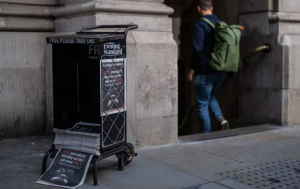The decision by the Evening Standard to stop producing a daily edition, from Monday to Friday, leaves Londoners without their own general newspaper. Under its current owners, the Standard, which is 197 years old, has faded to a shadow of its former, showy self. But this is a dismaying move all the same. A city of London’s size and importance, with a mayoralty and 32 borough councils, ought to have a dedicated print news outlet aside from the business-focused City AM. This is not just a matter of holding politicians, local services and businesses to account. It is about the city as a place with its own civic identity, its own arts and food scenes and sporting events, as well as serious problems including a housing affordability crisis.
The title has faced the same pressures as other print media, above all falling sales and advertising due to intense competition from digital rivals. It was given an injection of life when it went free in 2009 and pivoted to an advertising-led model. But the combination of higher newsprint costs, wifi on the London Underground and increased home working have finished it off. While a weekly version is promised, along with a boost to its online presence, the 15 years of Lord Lebedev’s majority-ownership do not inspire confidence. He spent tens of millions on the loss-making TV project London Live while slashing editorial budgets. His decision to make former chancellor George Osborne editor was not popular with staff, but in line with his apparent desire to use the title to boost his social standing. According to its accounts, the business has lost £84.5m in six years.
Nevertheless, it must be hoped either that an improved Standard website will attract a bigger audience, or that another publication will fill the gap.
Outside London things are even more grim. At least 300 local papers closed in the UK between 2009 and 2019. The negative consequences for civic life, and for local democracy, have been widely noted. Last year the digital, culture, media and sport committee recommended an expansion of the BBC-funded Local Democracy Reporter Service, and government support for a fund to promote innovation in news provision. Initiatives such as the cooperatively owned Bristol Cable, and newsletters pioneered by the Manchester Mill and Sheffield Tribune, give some grounds for optimism. But other places, particularly poorer ones, have become local news deserts.
The press is not a cure-all. Local reporters do not necessarily shrink the gap between people and their elected representatives. However, the devolution of significant powers to mayors across England makes scrutiny essential. London has a population of 9 million. Its mayor, Sadiq Khan, controls a budget of more than £20bn. Its councils struggle to fulfil their statutory obligations, notably in social care and housing. Beyond that, in a world of filter bubbles, Facebook gossip and closed WhatsApp groups, a shared sense of place remains important.
London has not been well served by Lord Lebedev, who is also a friend of Boris Johnson. Since buying the Evening Standard and Independent, he has sold significant stakes in them to a Saudi businessman. The decline of print is not his fault. Nor is the overwhelming dominance in online advertising of Google and Meta. But with more imagination and a real commitment to its audience, it should have been possible to reimagine the Standard for a digital age.
the Guardian

